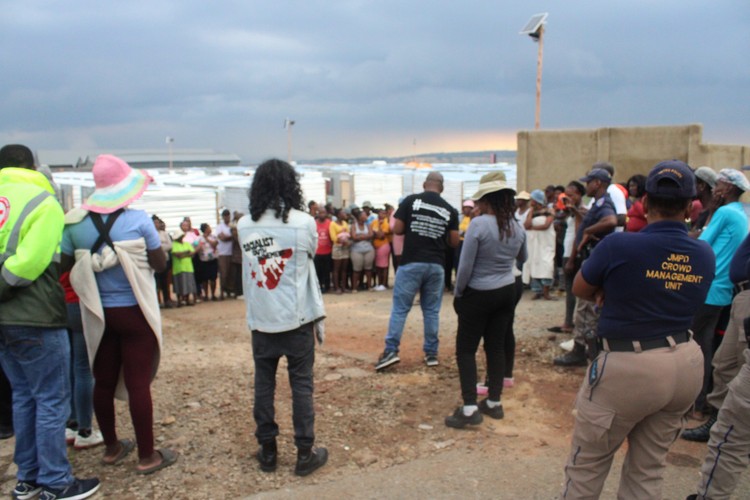Joburg building fire survivors demand better housing after their settlement floods
“As if what we already went through wasn’t enough, the government goes on to move us to this dreadful settlement” says fire survivor
Albert Street building fire survivors and activists, who are part of the Marshalltown Fire Justice Campaign, meet at the Denver settlement on the outskirts of the city centre on Wednesday to discuss their poor living conditions. Photo: Kimberly Mutandiro
- Survivors of the Albert Street building fire in Johannesburg and activists gathered on Wednesday for an emergency meeting.
- The building was engulfed in a fire in August 2023 that killed 77 people, including 12 children, and displaced hundreds of people.
- Survivors were placed in various shelters across the city. But in November they were evicted and relocated to the Denver settlement.
- But the settlement has been badly flooded in recent weeks, destroying the few belongings they had left.
It has been nearly five months since the Albert Street building fire in Johannesburg’s city centre killed 77 people, including 12 children, and displaced hundreds of people.
Survivors, who include South Africans and immigrants, were placed in shelters across the city. In November they were reportedly evicted from the shelters under controversial circumstances which led to the arrest of 30 immigrants who are currently being kept at the Lindela Repatriation Centre.
Many of the survivors were then relocated to the Denver settlement, just outside the city centre.
But Joburg’s rainy season has made things hard for the group as the settlement has been badly flooded.
On Wednesday, activists from the Johannesburg Fire Support Group, Kopanang Africa Against Xenophobia, and the General Industries Workers Union of SA (GIWUSA), among others who are part of the Marshalltown Fire Justice Campaign, gathered at the Denver settlement for an emergency meeting.
Activists accused the City of Johannesburg of failing to adequately provide services to the fire survivors because most of them had lost livelihoods when they were forced to move from the business district.
They also criticised the City for relocating the survivors to a flood-prone area.
One of the survivors, Andile Mzimela, says life has been unbearable since the fire. She said that she had no choice but to send her baby to her family’s home in rural KwaZulu-Natal.
She was separated from her Tanzanian husband after the fire because they were sent to different shelters. In November, when all fire victims were evicted from shelters, Mzimela hoped to be reunited with her husband. But that never happened. She said her husband and many other foreign nationals were taken to the police station because they did not have the relevant documents in November.
She now lives in the Denver Settlement with about 40 other families.
“As if what we already went through wasn’t enough, the government goes on to move us to this dreadful settlement,” said Mzimela.
Families reported that their homes have been flooded in recent weeks, badly damaging the few possessions they had left. Some of the shacks were completely destroyed by rain last Friday.
The community relies on only two communal taps for water, and women have complained of health problems from the chemical toilets.
Mawetlwe Sebei, president of GIWUSA, said, “The City has been moving the fire victims from one form of emergency accommodation to another. These so-called temporary housing facilities are inadequate and have been the cause of one tragedy after another. The City should fulfil its constitutional obligation of providing decent housing to the people.”
According to Nigel Braken from the Johannesburg Fire Victims Support Group, the City is yet to fully comply with a court ruling in November ordering it to provide full services to the Denver community.
He said the City had agreed to finalise the installation of four more standpipes and three water taps within 60 days of the order, which has not been done. Other agreements included the provision of 20 additional toilet facilities, of which 30 are already on site; the installation of prepaid electricity; a drainage system; and security patrol, which have also not yet been adhered to.
“People who lost IDs have not yet been supplied with new ID books. We need to make sure that children are placed in schools and that there is access to healthcare. We will go back to court if we have to ensure that the City complies,” said Braken.
After the meeting, activists resolved to strike should the City not provide adequate services for the community soon.
Questions were sent to the City on Thursday morning. We’ll update this article when we receive a response.
Support independent journalism
Donate using Payfast

Don't miss out on the latest news
We respect your privacy, and promise we won't spam you.
Next: Retrenched eThekwini workers shot at with rubber bullets while marching to ANC offices
Previous: Gang extorts money from people occupying government flats
© 2024 GroundUp. This article is licensed under a Creative Commons Attribution-NoDerivatives 4.0 International License.
You may republish this article, so long as you credit the authors and GroundUp, and do not change the text. Please include a link back to the original article.
We put an invisible pixel in the article so that we can count traffic to republishers. All analytics tools are solely on our servers. We do not give our logs to any third party. Logs are deleted after two weeks. We do not use any IP address identifying information except to count regional traffic. We are solely interested in counting hits, not tracking users. If you republish, please do not delete the invisible pixel.

